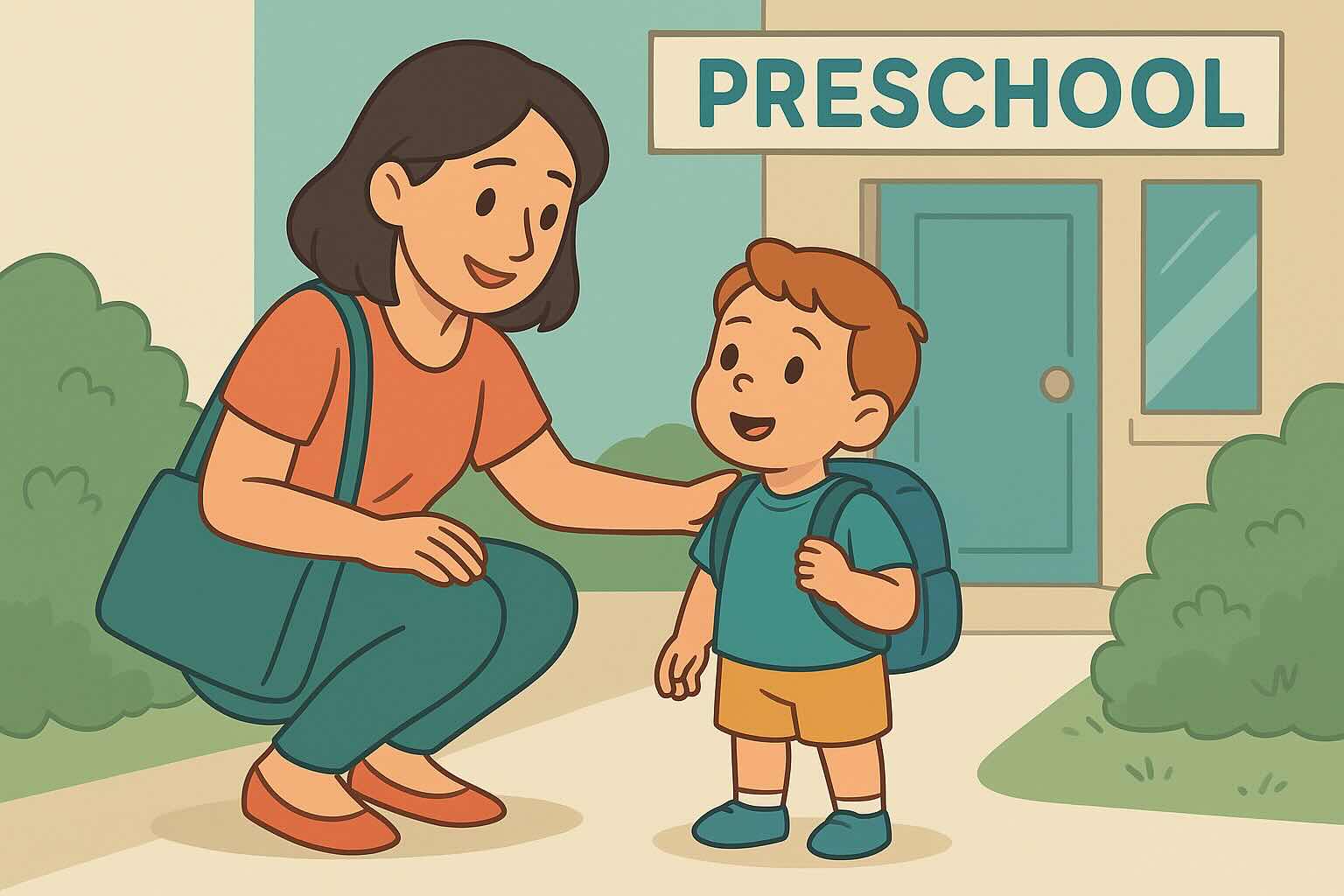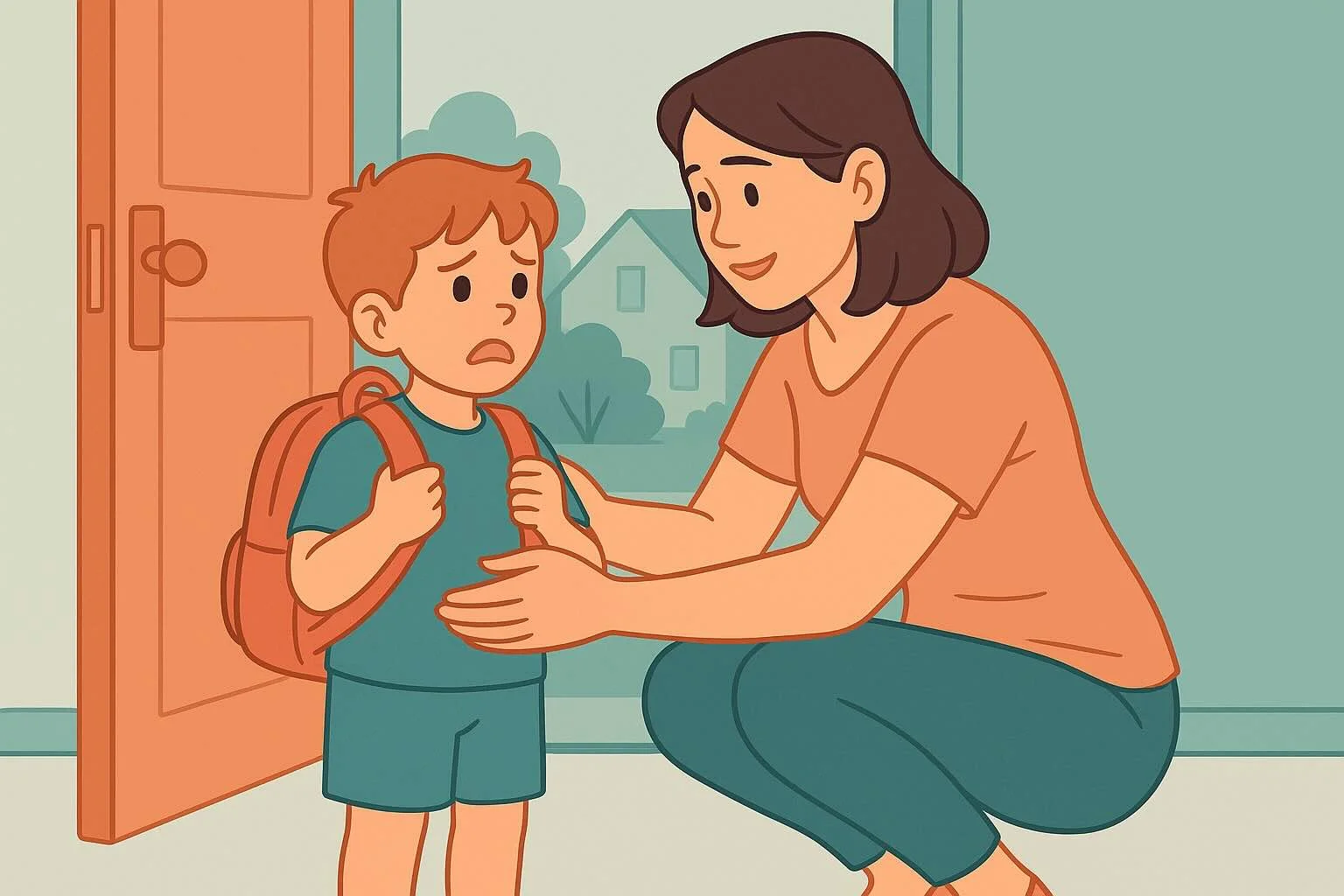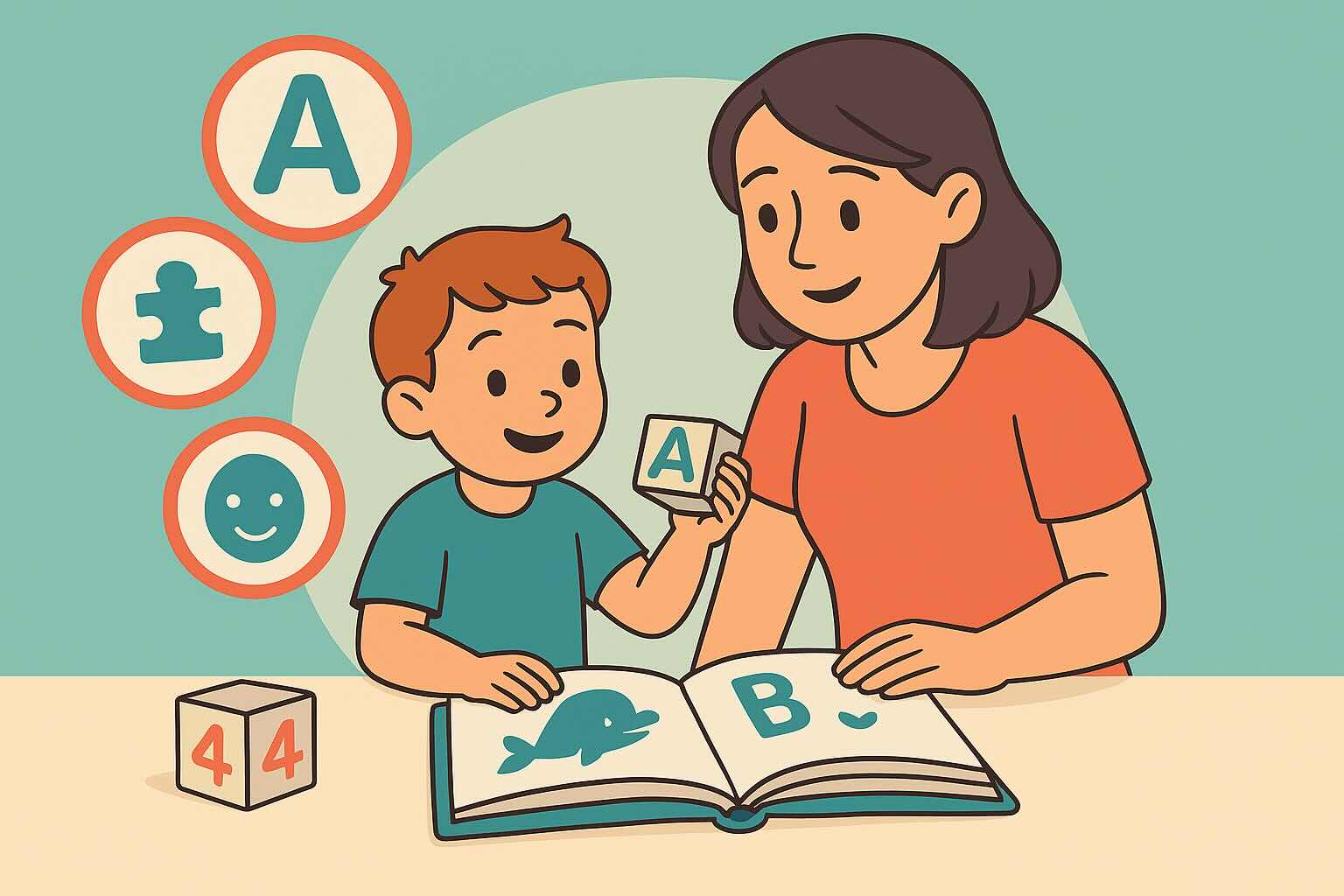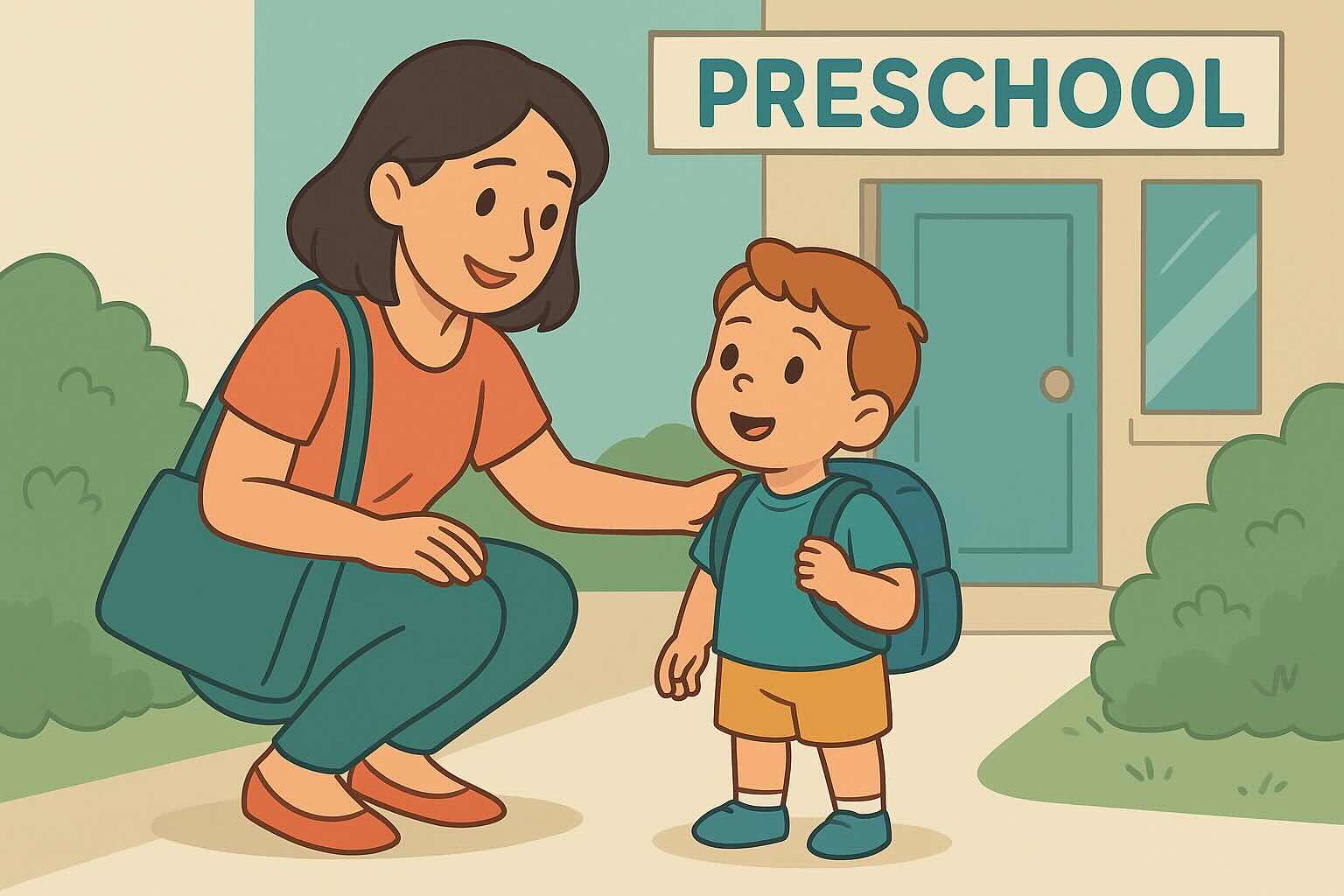Starting Preschool at 4: Advanced Preparation Guide for School Success


Starting preschool at 4 opens up a world of enhanced learning opportunities, deeper friendships, and greater independence—but it also comes with higher expectations and more complex social dynamics. Research shows that 4-year-olds in preschool programs demonstrate significant gains in school readiness, social skills, and emotional regulation, making this transition both exciting and crucial for future academic success.
This comprehensive guide addresses the unique developmental needs of 4-year-olds, who are more cognitively advanced than 3-year-olds but still developing the emotional regulation and social skills needed for school success. You'll discover evidence-based strategies to prepare your child for the academic, social, and emotional demands of a more structured preschool experience.
For comprehensive transition support, explore our guides on preparing 5-year-olds for kindergarten, managing routine changes, building cooperation, and sensitive child strategies.
What You'll Learn in This Guide
- 4-Year-Old Development and Advanced Readiness - Understanding your child's enhanced capabilities and continued needs
- Academic Preparation Without Pressure - Building pre-literacy and numeracy skills through play and exploration
- Social-Emotional Skills for Group Success - Developing cooperation, empathy, and conflict resolution abilities
- 8-Week Preparation Timeline - Structured approach to building readiness and confidence
- Managing Performance Anxiety - Helping perfectionistic 4-year-olds embrace learning and mistakes
- Advanced Independence Skills - Self-advocacy, problem-solving, and emotional regulation strategies
- Partnership with Teachers - Effective communication and support for your child's unique needs
Estimated reading time: 14 minutes
Understanding Your 4-Year-Old: The Bridge Between Preschool and Kindergarten
The Expanding Mind of a 4-Year-Old
Your 4-year-old stands at a remarkable developmental crossroads. Their cognitive abilities have expanded dramatically—they can engage in complex reasoning, understand cause and effect, and express sophisticated thoughts and emotions. Yet their emotional regulation, impulse control, and social skills are still developing, creating unique opportunities and challenges for preschool success.
Cognitive advances that support preschool learning:
- Abstract thinking emergence allows understanding of concepts like yesterday/tomorrow, bigger/smaller
- Improved memory helps them follow multi-step instructions and remember classroom routines
- Language sophistication enables complex communication and storytelling
- Curiosity and questioning drive deeper engagement with learning activities
- Beginning logical reasoning supports problem-solving and academic tasks
Emotional and social development still in progress:
- Emotional intensity remains high with developing regulation skills
- Social dynamics become more complex but skills are still emerging
- Perfectionism may emerge as cognitive abilities outpace emotional maturity
- Independence increases while still needing significant adult support and guidance
The 4-Year-Old Brain and Learning Environments
At 4, your child's brain is incredibly active in areas responsible for language, memory, and social understanding. The prefrontal cortex—responsible for executive functioning, emotional regulation, and impulse control—is developing rapidly but won't be fully mature for many years. This creates children who can engage in sophisticated thinking while still needing support for emotional regulation and self-control.
How this affects preschool experience:
- Can understand and follow complex classroom rules but may need reminders for consistency
- Capable of engaging in academic activities but may become frustrated when tasks feel difficult
- Interested in friendship and social connection but may struggle with conflict resolution
- Eager to please teachers and follow expectations but may be hard on themselves when they make mistakes
Individual Differences in 4-Year-Old Readiness
Academically curious children may show strong interest in letters, numbers, and formal learning activities but need support for social and emotional aspects of school.
Socially oriented children may thrive in group activities and friendship-building but need encouragement for academic engagement and task persistence.
Cautious perfectionists may excel when they feel confident but struggle with new challenges or making mistakes in front of others.
High-energy explorers may love the stimulation of preschool but need extra support for following group expectations and sustained attention.
Understanding your child's individual profile helps you prepare appropriately and communicate effectively with teachers about their needs.
Academic Preparation: Building Skills Without Pressure
The Foundation Skills That Matter Most
While 4-year-olds don't need to read or do math before preschool, certain foundation skills support their success in more structured learning environments. Focus on building enthusiasm for learning and basic skills rather than formal academic achievement.
Pre-literacy skills that support reading readiness:
- Name recognition and beginning letter awareness
- Understanding that print carries meaning and books have structure
- Phonological awareness: rhyming, alliteration, and beginning sound recognition
- Story comprehension and vocabulary development through rich book experiences
- Fine motor skills for eventual writing: cutting, drawing, tracing
Pre-numeracy skills for mathematical thinking:
- Number recognition 1-10 and beginning counting skills
- Shape and pattern recognition in everyday environments
- Size and spatial relationships: bigger/smaller, inside/outside, before/after
- Beginning measurement concepts through cooking and building activities
- Sorting and classification skills with everyday objects
Building these skills naturally:
- Read together daily and discuss stories, characters, and predictions
- Point out letters and numbers in environmental print (signs, labels, books)
- Play counting games during daily routines (stairs, toys, snacks)
- Provide opportunities for drawing, cutting, and manipulating small objects
- Engage in cooking, building, and sorting activities that develop mathematical thinking
Fostering Academic Enthusiasm
Create positive learning associations:
- Follow your child's interests and build on their natural curiosity
- Celebrate effort and progress rather than correctness or achievement
- Make learning playful and hands-on rather than worksheet or drill-based
- Model your own learning and curiosity about the world
- Provide rich experiences that expand vocabulary and background knowledge
Avoid academic pressure:
- Don't push formal skills if your child shows resistance or stress
- Focus on building confidence and love of learning over specific achievements
- Avoid comparing your child's academic progress to peers or siblings
- Remember that children develop academic readiness at different rates
- Trust that quality preschool programs will build on your child's natural development
Social-Emotional Skills for Group Success
Understanding 4-Year-Old Social Development
4-year-olds are naturally more social than younger children, showing genuine interest in friendship and cooperative play. However, their social skills are still developing, and they need explicit teaching and practice to navigate group dynamics successfully.
Emerging social abilities:
- Cooperative play with shared goals and negotiated rules
- Empathy development allowing them to understand others' feelings
- Conflict awareness while still needing support for resolution strategies
- Friendship concepts including loyalty, sharing, and mutual enjoyment
- Group participation with understanding of group rules and expectations
Social challenges that may arise:
- Difficulty sharing favorite toys or adult attention
- Frustration when social interactions don't go as expected
- Confusion about social cues and unspoken rules
- Competition with peers for attention or achievement
- Emotional reactions to perceived unfairness or exclusion
Essential Social Skills for 4-Year-Old Preschool Success
Cooperation and sharing:
- Willingly take turns with materials and activities
- Share adult attention during group time
- Participate in group activities even when not their first choice
- Help with classroom tasks and community responsibilities
- Show flexibility when plans or activities change
Communication and conflict resolution:
- Express needs and feelings with words rather than physical actions
- Ask for help appropriately when facing social challenges
- Use polite language consistently in interactions with peers and adults
- Listen to others and respond appropriately in conversations
- Attempt to solve simple interpersonal problems independently before seeking adult help
Empathy and emotional intelligence:
- Notice when others are hurt, sad, or upset and respond with kindness
- Understand that different people have different feelings about the same situation
- Show genuine concern for friends and classmates
- Celebrate others' successes without jealousy or competition
- Include others in play and activities rather than excluding peers
Building social skills at home:
- Arrange regular playdates with multiple children to practice group dynamics
- Discuss social situations and model appropriate responses to conflicts
- Read books about friendship, kindness, and emotional intelligence
- Practice perspective-taking: "How do you think your sister felt when that happened?"
- Create family activities that require cooperation and teamwork
Managing 4-Year-Old Emotional Regulation
4-year-olds experience emotions intensely and are still developing the skills to manage big feelings appropriately in group settings. Preschool success requires helping your child develop emotional regulation strategies they can use independently.
Emotional regulation skills for preschool:
- Recognize body signals that indicate rising emotions (tight muscles, fast heartbeat, hot face)
- Use calming strategies independently when feeling overwhelmed
- Express frustration with words rather than physical actions
- Accept comfort from teachers and other adults when parents aren't available
- Bounce back from disappointments or setbacks within a reasonable time frame
Teaching emotional regulation:
- Practice calming strategies during non-stressful times so they're available during difficult moments
- Help your child identify and name emotions with specific feeling words
- Model your own emotional regulation and discuss your strategies aloud
- Create a calm-down space at home where your child can go when overwhelmed
- Read books about emotions and discuss characters' feelings and coping strategies
The 8-Week Preschool Preparation Timeline for 4-Year-Olds
8 Weeks Before: Assessment and Foundation Building
Evaluate current readiness across multiple domains:
- Academic interest and foundation skills
- Social interaction abilities and friendship skills
- Emotional regulation and coping strategies
- Independence in self-care and problem-solving
- Communication skills and ability to ask for help
Begin foundational conversations:
- "In a couple of months, you'll start preschool where you'll learn lots of new things and make friends."
- "Preschool is different from staying home—there will be more children and structured activities."
- "You'll have teachers who will help you learn and discover new things."
- Address any questions or concerns your child expresses about starting school
6 Weeks Before: Skill Building and Independence Development
Focus on advanced independence skills:
- Complete bathroom independence including wiping, handwashing, and clothing management
- Eating lunch independently with appropriate table manners
- Opening various containers, packages, and supplies without assistance
- Managing personal belongings and following multi-step instructions
- Problem-solving simple challenges before asking for help
Academic skill development:
- Incorporate pre-literacy activities into daily routines naturally
- Practice sustained attention with increasingly challenging activities
- Build fine motor skills through drawing, cutting, and manipulation activities
- Develop number sense through counting and mathematical thinking in everyday contexts
- Engage in activities that require following directions and completing tasks independently
4 Weeks Before: Social Skills and Program Familiarity
Intensive social skill development:
- Arrange group playdates with multiple children to practice social dynamics
- Practice conflict resolution skills and emotional regulation in social contexts
- Work on cooperation, sharing, and group participation
- Develop conversation skills and appropriate social communication
- Practice empathy and kindness in interactions with others
Program preparation:
- Visit the preschool environment and meet teachers if possible
- Look at school materials and discuss daily schedule and expectations
- Read books about preschool and discuss what to expect
- Practice school-like activities: circle time, group projects, following classroom rules
- Begin adjusting daily routines to match preschool schedule
2 Weeks Before: Integration and Confidence Building
Integrate all readiness skills:
- Practice complete morning routines including self-care and time management
- Demonstrate academic, social, and emotional skills in integrated activities
- Build confidence through mastery of age-appropriate tasks and challenges
- Address any remaining concerns or anxiety about starting preschool
- Finalize practical preparations and logistics
Final preparations:
- Complete supply shopping and organization with your child's input
- Practice the commute and arrival routine at the school
- Meet with teachers to discuss your child's individual needs and strengths
- Plan first-day traditions or celebrations to mark this important milestone
- Ensure all paperwork, medical requirements, and emergency information is complete
Managing Performance Anxiety and Perfectionism
Understanding 4-Year-Old Perfectionism
Many 4-year-olds develop perfectionistic tendencies as their cognitive abilities expand. They can envision how they want something to look or work, but their fine motor skills and experience haven't caught up to their mental image. This gap can create frustration and anxiety about making mistakes or not meeting their own high expectations.
Signs of perfectionism in 4-year-olds:
- Reluctance to try new activities for fear of not doing them "right"
- Emotional meltdowns when work doesn't meet their internal standards
- Comparison to other children's work or abilities
- Avoidance of challenging tasks or activities
- Need for excessive adult reassurance about their performance
Supporting healthy achievement motivation:
- Focus on effort and process rather than outcomes: "I love how you kept trying different ways to solve that puzzle"
- Normalize mistakes as part of learning: "Mistakes help our brains grow stronger"
- Model your own learning process and mistakes without shame
- Provide appropriately challenging activities that allow for success with effort
- Avoid comparing your child to others or setting unrealistic expectations
Building Resilience and Growth Mindset
Developing resilience for preschool challenges:
- Practice difficult tasks in low-pressure environments at home
- Celebrate persistence and effort even when outcomes aren't perfect
- Discuss how skills develop over time with practice and learning
- Share stories of your own learning challenges and growth
- Help your child see mistakes as information rather than failures
Growth mindset language:
- Replace "I can't do this" with "I can't do this yet"
- Change "I'm not good at this" to "I'm still learning this"
- Transform "This is too hard" into "This will help my brain grow"
- Shift "I made a mistake" to "Mistakes help me learn"
- Convert "I'm not smart" to "I can get better with practice"
Advanced Independence Skills for 4-Year-Olds
Self-Advocacy and Communication
4-year-olds can develop sophisticated self-advocacy skills that serve them well in preschool environments. These skills help them get their needs met while building confidence and independence.
Essential self-advocacy abilities:
- Ask for help with specific problems: "I can't reach the art supplies on the high shelf"
- Communicate feelings and needs clearly: "I feel frustrated because I don't understand the directions"
- Express preferences and make choices when appropriate: "I'd like to work in the quiet area today"
- Ask questions when confused or curious: "Why do we need to wash hands before snack?"
- Report problems or conflicts to adults when needed: "Someone is being unkind and I tried to solve it myself but need help"
Building self-advocacy:
- Practice different scenarios at home where your child needs to communicate needs
- Role-play asking for help, expressing feelings, and making requests
- Encourage your child to place orders at restaurants or ask questions in stores
- Discuss appropriate times to ask for help versus trying to solve problems independently
- Celebrate successful self-advocacy attempts even if the outcome isn't perfect
Problem-Solving and Critical Thinking
Advanced problem-solving for preschool success:
- Try multiple strategies when first attempt doesn't work
- Ask relevant questions to gather information needed for solutions
- Think through consequences before taking action
- Seek help appropriately when independent attempts aren't successful
- Apply learning from one situation to similar challenges
Developing problem-solving abilities:
- Present age-appropriate challenges and support your child's independent thinking
- Ask open-ended questions: "What do you think would happen if...?" or "How could we solve this problem?"
- Avoid rushing in to solve problems your child could handle with support
- Discuss daily problems and brainstorm solutions together
- Celebrate creative thinking and multiple solution attempts
Partnership with Teachers for 4-Year-Old Success
Effective Communication About Your Child's Needs
4-year-olds benefit from strong home-school partnerships that recognize their individual strengths, challenges, and learning style. Effective communication with teachers supports your child's adjustment and long-term success.
Important information to share with teachers:
- Your child's individual temperament and personality traits
- Effective strategies you use at home for motivation, comfort, and behavior support
- Areas of strength and interest that can be built upon in the classroom
- Challenges or concerns you've observed and approaches that have been helpful
- Family values and goals for your child's preschool experience
Questions to ask teachers:
- "What does a typical day look like for my child in your classroom?"
- "How is my child interacting socially with peers during different activities?"
- "What academic skills is my child showing interest in or struggling with?"
- "How can we support at home what you're working on in the classroom?"
- "What can you tell me about my child's emotional regulation and independence?"
Supporting Learning at Home
Creating a home environment that supports preschool learning:
- Establish consistent routines that mirror school expectations for organization and responsibility
- Provide a quiet space for focused activities and eventual homework
- Create opportunities for your child to practice school skills in home contexts
- Show genuine interest in your child's preschool experiences and learning
- Support teacher strategies and expectations with consistent approaches at home
Avoiding common home-school conflicts:
- Don't undermine teacher authority or decisions in front of your child
- Avoid rescuing your child from age-appropriate challenges or expectations
- Support consistent expectations between home and school when possible
- Address concerns with teachers directly rather than discussing them extensively with your child
- Trust teacher expertise while advocating for your child's individual needs
Your 4-Week Preschool Success Action Plan
Week 1: Comprehensive Assessment and Foundation
- Evaluate your child's readiness across academic, social, emotional, and independence domains
- Begin implementing daily routines that support preschool success
- Address any developmental concerns with your pediatrician or early childhood specialists
- Start positive conversations about preschool expectations and opportunities
Week 2: Intensive Skill Development
- Focus on areas of growth identified in your assessment
- Practice academic foundation skills through play and exploration
- Develop social skills through structured playdates and family interactions
- Build emotional regulation abilities through daily practice and teaching
Week 3: Integration and Application
- Combine multiple readiness skills in structured activities and challenges
- Visit the preschool environment and meet teachers if possible
- Practice complete daily routines including morning preparation and school schedule
- Address any anxiety or concerns your child expresses about starting preschool
Week 4: Final Preparation and Celebration
- Complete all logistical preparations and ensure your child feels prepared and confident
- Plan meaningful traditions or celebrations to honor this developmental milestone
- Focus on excitement and positive anticipation for the learning and friendships ahead
- Ensure open communication with teachers about your child's individual strengths and needs
Ongoing: Support and Partnership
- Monitor your child's adjustment with realistic expectations for 4-year-old development
- Maintain consistent communication with teachers about your child's progress and challenges
- Support your child's independence while providing emotional security and encouragement
- Celebrate growth and learning in all areas while maintaining focus on effort over achievement
Key Takeaways: 4-Year-Old Preschool Success
- ✅ 4-year-olds have enhanced cognitive abilities but still need emotional and social support
- ✅ Academic foundation skills matter but enthusiasm for learning is more important than formal achievement
- ✅ Social-emotional skills predict success more strongly than early academic abilities
- ✅ Independence and self-advocacy are crucial for navigating more structured preschool environments
- ✅ Perfectionism is common and needs supportive approaches that emphasize growth and learning
- ✅ Individual differences are significant - preparation should match your child's unique profile
- ✅ Home-school partnership supports adjustment and long-term academic success
- ✅ Adjustment typically takes 2-4 weeks but full integration may take 6-8 weeks
- ✅ Professional support is available for children who need additional time or different approaches
- ✅ Building positive associations with learning sets the foundation for lifelong educational success
Remember: Your 4-year-old's preschool experience should build confidence, curiosity, and joy in learning. Trust their individual development while providing the academic, social, and emotional preparation they need to thrive in their new environment.
This article is based on early childhood development research and educational psychology. Individual experiences vary based on child temperament, family circumstances, and program quality. Consult with teachers, school counselors, or your pediatrician if you have concerns about your child's preschool adjustment or readiness.
24/7 AI Parenting Assistant
Get instant, personalized advice with expert-curated parenting knowledge. Chat with your AI coach anytime, anywhere.

Self-Care for Parents
Daily affirmations, guided meditations, and journaling tools to help you stay centered and emotionally balanced.

Routine Transition Planner
4-week method for implementing routine changes successfully with gradual strategies and resistance management techniques.
Frequently Asked Questions
Need personalized support?
RootWise's AI coach can provide tailored strategies for your specific situation, available 24/7 when you need it most.
Learn More About AI Coaching →



